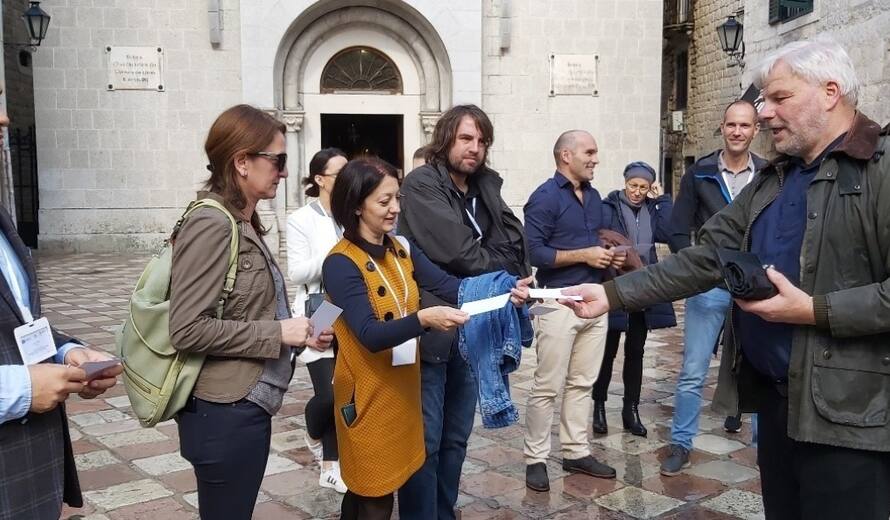Innovative approach to enhancing interpretation of World Heritage properties introduced by the Report
The “Interpretive Planning at World Heritage Properties in Europe” report published by UNESCO presents the concept, methodology, and outcomes of the first regional training course on enhancing interpretive planning at World Heritage properties in Europe, held in 2021. The initiative aims to highlight the potential of heritage interpretation in transversally supporting the objectives of World Heritage conservation and management, and introducing a participatory, value-based approach to heritage interpretive planning, aligned with a sustainable development perspective.
The interpretation and presentation of heritage are becoming increasingly relevant alongside the growing awareness of the cross-cutting contribution that the heritage sector can make to society, and of the necessity for greater and more inclusive involvement of social actors in heritage management.
Heritage interpretation, as a structured approach to non-formal learning that focuses on communicating significant ideas about a place to people, can play a unique role in fostering effective and inclusive heritage management, through ensuring greater alignment with sustainable development values and introducing participatory approaches.
To promote the transformative potential of heritage interpretation and explore a comprehensive, practical approach to capacity-building in this regard, the UNESCO Regional Bureau for Science and Culture in Europe launched the WH-Interp initiative with the development and delivery of a pilot course in 2021.
The course addressed 3 main subjects identified as major areas of knowledge and competencies for interpretive planners working at World Heritage properties, namely: the World Heritage system and operational guidelines; principles and qualities of heritage interpretation, and the comprehensive approach to interpretive planning.
The entire course, spanning from mid May to mid November 2021, was delivered through 3 progressive phases: a preparatory phase with introductory webinars and warm-up exercises; a face-to-face 1-week training workshop hosted by the city of Kotor, Montenegro; and a post-workshop assignment with trainers’ distance support.
29 professionals working for World Heritage properties from 14 countries in South-East Europe and the Mediterranean basin benefitted from the pilot course to advance their knowledge and competencies in interpretive planning.
'I will apply what I learned during the Workshop by developing an interpretation plan and try to convince the managers to implement it or at least parts of it. I will certainly apply the interpretive approach in my next guided tour.'
Features of the 2021 pilot course that were highly appreciated by participants include:
- Drawing on the Certified Interpretive Planner course of the European Association for Heritage Interpretation (Interpret Europe), the course provided a general understanding of the heritage interpretation discipline, including the principles and process of interpretation planning.
- With the technical support of experts in World Heritage, the course was tailored to suit the specific World Heritage context. It particularly broadened the vision of World Heritage interpretation by aligning its meaning-making process with multi-layered values around the property, starting from the Outstanding Universal Value (OUV) of the property to encompass issues related to sustainable development of broader territories.
- The course programme balanced theory and practice, demonstrating in a real-case scenario - the city of Kotor - how heritage interpretation can support the achievement of World Heritage management objectives. The combination of various learning modalities, including lectures, site visits, group work, and individual assignments ensured effective learning and facilitated the application of the newly gained knowledge and skills.
- The course enabled participants to concretely contribute to the improvement of interpretive planning at their respective World Heritage properties with the help of trainers providing constant support in participants’ individual exercises on their own cases.
- The course provided a group of heritage practitioners and interpretive planners with an opportunity to interact - both online and offline - , serving as a regional forum for mutual learning and networking.
'This training was all that I was searching for during the last years! I understand from the course that a World Heritage site should not only be well preserved but also be lived, promoted and shared by the entire world; this training should be replicated across the region and the concept of interpretive planning could be adopted by all sites, museums, etc.'
The report presents the concept, methodology, programme and outcomes of the pilot WH-Interp course. It primarily targets practitioners, institutions, and networks with direct responsibilities for planning and implementing World Heritage site management systems. More broadly, whoever is seeking advice and guidance on strengthening their knowledge and competencies in the field related to heritage interpretation may also find inspiration in the paper.
The WH-Interp course directly contributes to the implementation of the World Heritage Capacity Building Strategy, which includes interpretation among the principal learning areas for communities and networks.
The skills and expertise of trainers from Interpret Europe were instrumental in the making of the pilot course and greatly contributed to its success. The face-to-face workshop of the course was made possible thanks to the generous support and warm hospitality of the City of Kotor, and the National Commission for UNESCO of Montenegro.
Links
- Report of the pilot regional course on Interpretive Planning at World Heritage Properties in Europe (WH-Interp) https://unesdoc.unesco.org/ark:/48223/pf0000381194
- Pilot regional course on Interpretive Planning at World Heritage Properties completed its second module: https://en.unesco.org/news/pilot-regional-course-interpretive-planning-world-heritage-properties-completed-its-second
- Event page of the pilot regional course on Interpretive Planning at World Heritage Properties in Europe: https://events.unesco.org/event?id=1786178879&lang=1033
- Call for Applications of the pilot regional course on Interpretive Planning at World Heritage Properties in Europe: https://en.unesco.org/news/call-applications-pilot-regional-course-interpretative-planning-world-heritage-properties
- Interpret Europe – European Association for Heritage Interpretation: https://interpret-europe.net/
- World Heritage property “Natural and Culturo-Historical Region of Kotor”: https://whc.unesco.org/en/list/125/
- World Heritage property “Venetian Works of Defence between the 16th and 17th Centuries: Stato da Terra – Western Stato da Mar” in which the old town of Kotor is an integral part: https://whc.unesco.org/en/list/1533/

